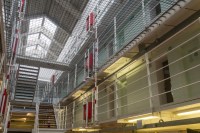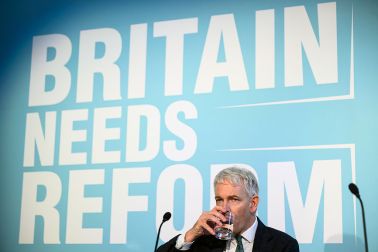This column may not, I admit, have praised the Foreign Office at all times, so it is pleased to reveal an admirable FCO operation which has been going on, quietly and successfully, since early last year. In 2008, it became clear — many would say it was clear much, much earlier — that the plight of British citizens in Zimbabwe was desperate. Hyperinflation, and the refusal of Robert Mugabe’s government to honour their pensions, had made many destitute. In February 2009, the British government set up a resettlement scheme for British citizens over 70 who had right of abode here. If they agreed to settle permanently in the United Kingdom, they were flown to Gatwick and then placed in care homes and sheltered accommodation across the country. Four hundred people came, and the last are just arriving now. Since they have almost no assets of any realisable kind, they will be supported for life. A friend who has helped them tells me of the pathos. They were often overcome with grief at the airport in Harare, but showed great courage once the partings were over. When these people were young, many of them or their parents were lured out to what was then Rhodesia by the promise of opportunity after the war. Every hope collapsed, not just for them, but for the whole country. It is some comfort that they can at last live in peace.
Basil Davidson, who died recently aged 95, was, by all accounts a likeable man. This may in part explain why the obituaries were so admiring as to shed little light. For the truth is that Davidson’s career provides a textbook example (though modern textbooks, of course, would be the last to publish it) of the misinterpretation of the second half of the 20th century. In the war, Davidson was one of those who misled Churchill into helping communism in the Balkans. In 1950, he published a book called Germany: What Now? which favoured East Germany and attacked free-market policies in West Germany because they ‘were really provoking and protecting… the worst kind of German nationalism’. Three years later, he came out with Daybreak in China, which concludes: ‘If the [Communist] Chinese Revolution has an inner message for the rest of us… it is this, and this above all, that man is good by nature.’ Davidson lived to see this revolution kill roughly 40 million people. He turned his attention, above all, to the emerging governments of post-colonial Africa, with a series of books celebrating the revolutionary movements which turned their countries into one-party states and then brutal dictatorships. The Fortunate Isles was the title of his book about the Cape Verde Islands, a country so miserable after it gained independence from Portugal that more than a third of its people emigrated. In order to understand that, even now, the illusions of people like Davidson have never been overthrown, you need only imagine the sort of obituaries he would have received if he had written books in favour of Hitler, Franco, Papa Doc Duvalier or General Somoza.
The left has, nevertheless, had to adapt. A bit of its genealogy was traced recently in evidence to the Political and Constitutional Reform Committee of the House of Commons by the constitutional expert, Michael Pinto-Duschinsky, on the subject of the Alternative Vote. He pointed out that Unlock Democracy, which helps lead the campaign for AV, lives chiefly off what he called the ‘Moscow gold’ which paid for the premises of the Communist Party of Great Britain. When the CPGB was dissolved, its property devolved upon its successor, the Democratic Left, which in turn became the New Politics Network. The Network ‘morphed’ into the campaign group Unlock Democracy. Just after reading this evidence, I happened to receive an email from Unlock Democracy’s director which urged supporters to fight for AV and ended with the impeccably Marxist words: ‘…we will confine first past the post to the dustbin of history’. A luta continua, as Basil Davidson might have put it.
By chance, last week, I found myself stopping to buy a couple of things in Trowbridge. Perhaps I was jaundiced — it was a hot day, and I had driven 150 miles and needed lunch — but the effect of walking through the town was extraordinarily depressing. Intrinsically, the place is perfectly nice. Trowbridge is the county town of Wiltshire. It is in a beautiful and interesting part of England. It is not miserably poor. There are a good many handsome old stone buildings. But Trowbridge has reached the wrong sort of accommodation with the motor-car. Endless roads, with endless roundabouts, sweep round the edge of the town and one-way streets carve through the middle. Many of what must once have been the nicest areas have been pedestrianised, turning them into aimless wildernesses in which the least likeable people linger. There is also an appalling shopping precinct called The Shires. I didn’t see a single shop which was not either a chain or a charity enterprise — nothing that displayed any sign of talent, originality, workmanship, beauty or local pride. In fact, it was this lack of pride, visible, it seemed to me, in the demeanour of the tattooed people shuffling round, which was the saddest thing. This is a place, I felt, which has no excuse — extreme unemployment, sudden mass immigration — for itself. It could be ten times better if it tried. Why doesn’t it? Why are such failures repeated all over the country?
A small example of the target culture which, we are promised, will soon be a thing of the past. For the last five years, an Environmental Stewardship Scheme has paid money to farmers to improve their habitats for farmland birds. The results have been disappointing. The decline of these birds — the grey partridge is a particularly sad example — continues remorselessly. The scheme was for a long time considered a great success by Defra and Natural England, but their measure of success was the number of farmers who joined it (more than 70 per cent of those eligible). It was only much later than someone noticed that, for all the take-up, it was not working. So now the Wildlife and Game Conservation Trust has had the revolutionary idea that the best way to judge a scheme to increase the number of farmland birds is to pay farmers per bird recorded. The more birds, the more money.
Since Jonathan Ross has now left the BBC, I have renewed my television licence. But this does not seem to satisfy the Corporation. While accepting my cheque, TV Licensing has also written to me at the Daily Telegraph, where I have never had a television, telling me in red letters that my renewal is ‘overdue’. ‘BEEN AWAY TOO BUSY FORGOT LOST TRACK OF TIME?’, says its letter. It makes me feel like Gilbert Pinfold.






Comments